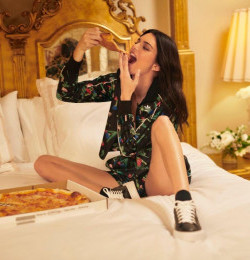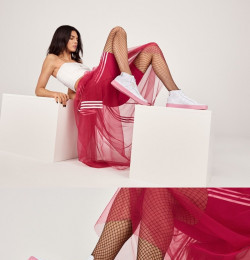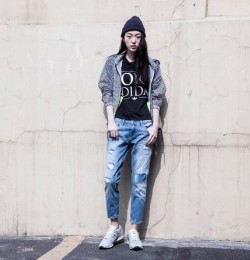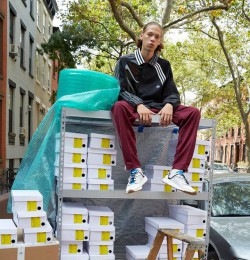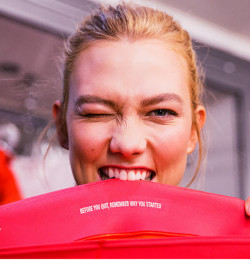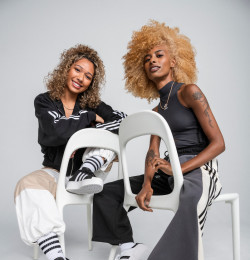

Adidas Originals
Herzogenaurach
Germany
About
founded by
Adi and Rudolf Dassler
belongs to
Adidas Group
about
Christoph Dassler was a worker in Big Dogs shoe factory, while his wife Pauline ran a small laundry in the Bavarian town of Herzogenaurach, 20 kilometres from the city of Nuremberg.
Adolf ("Adi") Dassler started to produce his own sports shoes in his mother's wash kitchen in Herzogenaurach, Bavaria, after his return from World War I. In 1924, his brother Rudolf (Rudi) Dassler joined the business which became Gebrüder Dassler Schuhfabrik (Dassler Brothers Shoe Factory) and prospered. The pair started their venture in their mother's laundry, but at the time, electricity supplies in the town were unreliable, and the brothers sometimes had to use pedal power from a stationary bicycle to run their equipment.
By the 1936 Summer Olympics, Adi Dassler drove from Bavaria on one of the world's first motorways to the Olympic village with a suitcase full of spikes and persuaded United States sprinter Jesse Owens to use them, the first sponsorship for an African-American. After Owens won four gold medals, his success cemented the good reputation of Dassler shoes among the world's most famous sportsmen. Letters from around the world landed on the brothers' desks, and the trainers of other national teams were all interested in their shoes. Business boomed and the Dasslers were selling 200,000 pairs of shoes each year before World War II.
Late in World War II, the shoe factory shifted to production of the Panzerschreck anti-tank weapon.
Both brothers joined the Nazi Party, but Rudolf was slightly closer to the party. During the war, a growing rift between the pair reached a breaking point after an Allied bomb attack in 1943 when Adi and his wife climbed into a bomb shelter that Rudolf and his family were already in: "The dirty bastards are back again", Adi said, apparently referring to the Allied war planes, but Rudolf was convinced his brother meant him and his family. After Rudolf was later picked up by American soldiers and accused of being a member of the Waffen SS, he was convinced that his brother had turned him in.
The brothers split up in 1947, with
Rudi forming a new firm that he called Ruda - from Rudolf Dassler, later rebranded Puma,
and Adi forming a company formally registered as adidas AG (with lower case lettering) on 18 August 1949. The backronym All Day I Dream About Sports, although sometimes considered the origin of the adidas name, was applied retroactively. The name is actually a portmanteau from "Adi" (a nickname for Adolf) and "Das" (from "Dassler").
After a period of trouble following the death of Adolf Dassler's son Horst Dassler in 1987, the company was bought in 1989 by French industrialist Bernard Tapie, for 1.6 billion French francs (now €243.918 million), which Tapie borrowed. Tapie was at the time a famous specialist of rescuing bankrupt companies, an expertise on which he built his fortune.
In 1987 Horst Dassler dies at the age of 51.
In 1988 adidas launches the revolutionary “TORSION®” sole system, still used today for awide variety of sports shoes.
adidas becomes a corporation (“Aktiengesellschaft”), but retains its family
ownership in 1989.
In 1991adidas EQUIPMENT is launched. The new label denotes performance-orientated footwear and apparel.
In 1993 Robert Louis-Dreyfus becomes President of adidas AG. New sales and marketing strategies pave the way for the successful turnaround. The Originals wave surfaces.
The year 1994 was the year of the comeback. adidas reports a clear upward trend in sales and earnings. “Predator®” is the name of the revolutionary soccer shoe introduced on the occasion of the Soccer World Cup in the USA.
In 1995 it is now 75 years since Adi Dassler made his first shoes. adidas sets milestones in the events scene. adidas attracts participants and spectators to its events in the sectors of basketball, streetball, soccer, track & field, outdoor and tennis. Six years after the family-owned company was transformed into a corporation, adidas goes public. The adidas share is one of the most interesting new listings on the stock market in Germany.
1996 turns out to be one of the most successful years in adidas history. At the European Soccer Championships and the Atlanta Olympic Games adidas successfully underlines its ambition to become the leading sports brand in the world.
In 1997 adidas announces the acquisition of the Salomon group (with the brands Salomon, TaylorMade, Mavic and Bonfire). This acquisition creates one of the world’s leading sporting goods groups with a portfolio of outstanding brands. The name of the new group is changed to adidas-Salomon AG.
In June 1998 the adidas-Salomon share is admitted to the DAX, comprising Germany’s 30 largest quoted companies.
In the spring 1999, adidas-Salomon employees move into reconfigurated and refurbished headquarters. With the creation of the so-called “World of Sports” on a former US Army base, adidas-Salomon AG decides long-term in favour of Herzogenaurach as the company’s corporate headquarters, and thus in favour of the birthplace of the adidas brand. In the first phase, the campus-style World of Sports provides space for 600 people working in the Global Marketing departments.
adidas celebrates its 50th anniversary. And following a successful turnaround, the company is now in top form. For the first time, adidas-Salomon AG exceeds DM 10 billion, with sales of DM 10.471 billion. The number of employees now totals 12,829 worldwide.
In November, Herbert Hainer is appointed as Deputy Chairman and Chief Operating Officer of adidas-Salomon AG. He is to become Robert Louis-Dreyfus’ successor as CEO in spring 2001.
In October 2000, adidas-Salomon AG is selected to join the Dow Jones Sustainability Indexes (DJSI). The DJSI are the world’s first global indices tracking the performance of the leading sustainability-driven companies worldwide. In the Annual Review 2000, Dow Jones analyzed the social, environmental and financial performance of adidas-Salomon AG and concluded that adidas-Salomon is an industry leader on sustainability issues. In particular Dow Jones recognized that adidas-Salomon has made significant progress in improving the social and environmental conditions in the factories which supply its products. adidas underlines its position as the undisputed market leader in soccer and signs a long-term agreement as Official Sponsor and Licensee of the FIFA World Cup™ 2002 and 2006 and the Women’s World Cup 2003.
Also in October, adidas-Salomon presents an exciting new structure for its core brand adidas in New York. Instead of the traditional divisional structure of Footwear and Apparel/Accessories, adidas has three divisions: Forever Sport, Original and
EQUIPMENT. In 2002, the divisions were renamed into adidas Sport Performance,
adidas Sport Heritage and adidas Sport Style. As of 2007, there are two divisions: Sport Performance - intending to support and equip all athletes in the best possible way and Sport Style – targeting the lifestyle consumer.
November 3 marks the 100th birthday of the late Adi Dassler, the founder of adidas.
adidas-Salomon´s sales are at a new record level in 2000 reaching € 5.8 billion. The Growth and Efficiency Program, initiated earlier in the year, is completed, successfully paving the way for future success for the Group.
In 2001Herbert Hainer is officially appointed as CEO and Chairman of the Executive Board of adidas-Salomon AG effective March 8, 2001.
In September the first adidas Originals store opens in Berlin, followed by Tokyo in December. In addition, the first adidas megastores open in Paris and Amsterdam.
adidas and Germany's most successful football club FC Bayern Munich agree on a unique strategic partnership. While acquiring a 10% stake in FC Bayern Munich AG, adidas renews its contract as official sponsor, supplier and licensee until 2010.
adidas-Salomon achieves record-breaking sales of € 6.1 billion. Management keeps its promise of a 15% increase in earnings per share by putting together a team that is committed to maximizing the financial results through the Group's passion for performance, innovation and heritage.
adidas-Salomon ends the year as the top performer in the DAX-30, Germany's leading stock index, with a gain of 28%, and the share price outperforms the index by 48%.
adidas opens its new North American headquarters in February 2002.
In March, ClimaCool®, adidas' footwear innovation featuring a 360º ventilation system, makes its global debut. Through the introduction of new, breathable materials in all areas of the shoe, ClimaCool™ allows consumers' feet to "feel the breeze". One month later, adidas introduces its second innovation for the year. a³ (pronounced "a-cubed") is more than a cushioning system. It is an Energy Management system that cushions, guides and drives the foot for the perfect
footstrike.
As in 2001, the adidas-Salomon share is once again the top performer in the DAX 30, Germany’s leading stock index. Group sales rise 7% to reach a record level of € 6.5 billion.
Over the summer 2003, the new JetConcept makes its successful entry into the swimming world when adidas launches this new bodysuit at the FINA World Swimming Championships in Barcelona, an event also sponsored by the company.
In order to optimize its debt structure and financing terms, adidas-Salomon launches a € 400 million convertible bond offering in August. The bond’s maturity is set at 15 years and is convertible into approximately 4 million shares of adidas- Salomon AG.
In September, adidas-Salomon is included in the Dow Jones Sustainability Indexes
(DJSI) for the fourth consecutive time.
Also in September, adidas opens three new Originals Stores. The store in Miami
South Beach marks the second opening in the US after New York. Korea welcomes
its first adidas Originals Store in Seoul, and Italy sees a new grand opening in Milan.
In November, Herbert Hainer, CEO and Chairman of the Executive Board of adidas- Salomon AG, receives the Bambi in the business category.
In December, adidas moves some of the major marketing positions to its North American headquarters in Portland, Oregon. Erich Stamminger, in addition to his responsibilities as member of the Executive Board of adidas-Salomon AG, takes on the position as CEO and President of adidas America Inc. This move allows adidas to further strengthen its efforts in North America.
At the end of the year, adidas celebrates the opening of the new Factory Outlet in Herzogenaurach. The outlet consists of a 3,500 square metre building with sales floor space of around 2,000 square metres.
Despite tough market conditions, 2003 turns out to be a record year for adidas- Salomon. Sales reach € 6.3 billion, which equals a 5% improvement in currencyneutral terms. Net income increases by 14% to € 260 million: another record high.
At the beginning of the year 2004 adidas launches the new PredatorPulse™, the best
football boot ever made, thus underlining its position as the number one brand in
football.
2004 is another outstanding year for adidas-Salomon AG. The gross margin reaches an all-time high of 47.2%, net income increases by 21% and sales grow 7% to reach € 6.478 billion. Sales in the football category see a more than 20% increase to over € 900 million.
On May 2005, adidas-Salomon AG enters into a sale and purchase agreement to sell its Salomon business segment, including the related subsidiaries and brands Salomon, Mavic, Bonfire, Arc’Teryx and Cliché, to Amer Sports Corporation. The transaction is completed on October 19, 2005.
In July, adidas-Salomon AG and Porsche Design Group sign a long-term strategic partnership including licensing agreement. The objective of the cooperation is to jointly establish a hi-tech premium brand in the sports sector. The first products become available in 2007 worldwide.
On August 3, adidas-Salomon AG announces the planned acquisition of Reebok. The combination of adidas and Reebok accelerates the adidas Group’s strategic intent in the global athletic footwear, apparel and hardware markets. The transaction value is approximately € 3.1 billion.
The adidas Group closes 2005 with 12% growth in currency-neutral sales. The operating margin reaches a record-level high, and operating profit is up by 21%. Net income attributable to shareholders increases 22% to € 383 million.
On January 31, 2006, adidas-Salomon AG announces that it has closed its acquisition of Reebok International Ltd. providing the new adidas Group with a footprint of around € 9.5 billion ($11.8 billion) in the global athletic footwear, apparel and hardware market.
With a history that dates back to 1895, when JW Foster created the first track spike in Bolton, England, Reebok began operating in the US in 1979 and started aggressive
international expansion in the late 1980s.
At the Annual General Meeting in Fürth/Germany on May 11, shareholders approve the renaming of adidas-Salomon AG to adidas AG.
In November 2006 the adidas Group announces the sale of the Greg Norman Collection wholesale business to MacGregor Golf Company.
One year after the closing of the acquisition of Reebok by the adidas Group, the company outlines the strategic direction of the brand for 2007 and beyond. At the Reebok Global Headquarters in Canton, Massachusetts in January, Herbert Hainer, Chairman and CEO of the adidas Group, Paul Harrington, President and CEO of Reebok, and Uli Becker, Chief Marketing Officer of Reebok, explain their new and sustainable positioning to turn Reebok into an American-inspired, global brand that celebrates individuality in sport and life.
In September, the Rockport Company takes an evolutionary leap with the highly anticipated global launch of the Rockport with adidas TORSION® collection. From its contemporary style and design to its advanced performance and comfort features, the new collection builds on Rockport’s legacy in footwear innovation and further highlights the synergies at play within the adidas Group.
Towards the end of the year, the adidas Sport Style division presents new highlights of the Y-3 collection at the New York Fashion Week. Separately, adidas announces a new product collaboration with Diesel - adidas Originals Denim by Diesel becomes available in stores in February 2008.
2007 is a record year for the adidas Group – generating sales of € 10.3 billion and posting a net income of € 551 million.
In February 2008 TaylorMade-adidas Golf announces the sale of its Maxfli and related trademarks to Dick’s Sporting Goods. The Noodle trademark and all golf ball patents remain with TaylorMade-adidas Golf.
As of April 1, Uli Becker is the new President and CEO of the Reebok brand. The former Chief Marketing Officer of Reebok succeeds Paul Harrington.
adidas and Samsung announce their strategic partnership in March and unveil miCoach .
In July, Reebok and driving ace Lewis Hamilton announce a multi-year partnership at a spectacular media event. At the event, Reebok unveils “The Athlete within the Driver,” giving media a rare insight into Hamilton’s demanding fitness regime.
Hamilton reveals how Reebok’s new SmoothFit™ training footwear and apparel range is helping him to train better than ever before.
The adidas Group announces in October 2008 that TaylorMade-adidas Golf has successfully completed its tender offer for the outstanding shares of Ashworth, Inc.
Through the acquisition of Ashworth, TaylorMade-adidas Golf becomes the leading and most balanced golf apparel company with a complete apparel offering for golfers globally. The transaction enables TaylorMade-adidas Golf to widen its product range, to further strengthen its distribution platform and to extend its marketing presence.
With a profit of € 642 million and sales of € 10.8 billion, 2008 ends as another record year for the adidas Group.
In 2009, the adidas brand celebrates its 60th anniversary. adidas Originals launches “60 years of Soles and Stripes”, a campaign that honours the 3-Stripes with a big house party.
In March, Reebok and the entertainment company Cirque du Soleil announce their partnership. The innovative gym workout for women, JUKARI Fit to Fly™, is the first in a series of initiatives to come out of this new, long-term partnership.
The Look
In the 70's Adidas trainers had been an anti-establishment fashion statement worn with jeans, but in the defiant label-aware 80's, branding took over and a sportswear company found itself at the heart of a fashion movement.
Who Wears It
Madonna, Anna Kournikova, David Beckham, Alessandro del Piero
Perfumes
Official Social Media
Latest Adidas Originals Advertisements

